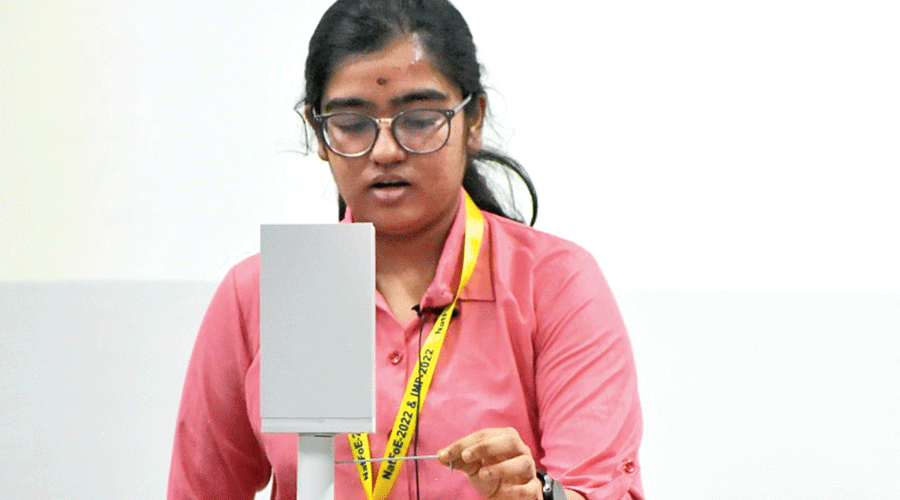A machine that can sprinkle both granular solids and liquid droplets in concentric circles around it up to a radius of about six metres has won a student of Jadavpur University (JU) the crown in a national innovation contest.
The National Competition on Innovation in Manufacturing Practices was held on the Salt Lake campus of JU on June 20. Organised jointly by the Indian National Academy of Engineering (INAE) and JU, the contest aimed to provide a platform for engineering students and start-up companies to showcase their innovations in the manufacturing sector.
The two-tier competition selected two best innovations from 55 entries from all over the country. Eighteen were chosen for the final round across three categories the competition was held in — undergraduate, postgraduate and start-up — on the basis of a video on the respective innovations that participants had to upload on the contest site a month in advance.
After a daylong demonstration in front of the judges by all finalists, Diya Ghosh, a first-year chemical engineering student, was declared the winner for her low-cost multitasking agricultural kit. “It is compact, lightweight, economical and easy to manufacture,” argued the 19-year-old from New Alipore in front of the panel of judges. The contraption is about 24.5inches in height and is run on electricity.
“I had such a device in my head for some time. I got to work on hearing about this competition. Seventy per cent of India’s economy is agrarian and of the farmers, about 80 per cent are marginal players. So for the country to do well, agriculture has to prosper. Most farming devices have single utility. But mine can handle both granular fertiliser and manure, and liquids in micro and macro level quantity. That means even water can be sprinkled on the field with the same machine,” Diya told The Telegraph.
Even the radius of coverage can be adjusted by the speed of the motor and the height from the ground at which the machine is placed, she pointed out.
According to the judges, the prototype can provide a viable low-cost alternative to the small farmers towards automising the multiple tasks of spreading seeds, fertilisers or pesticides, all using the same device.
The second prize went to K. Nivetha, a second-year engineering student from Hindusthan College of Engineering & Technology, Coimbatore, who developed a strategy of cutting down e-waste by recycling them as concrete mixture fillers. The two awards come with certificates and cash prizes of Rs 40,000 and Rs 20,000 for the top two from INAE.
“The fact that both winners are women exemplifies that the rapidly growing arena of engineering entrepreneurship will be prominently shared by women in the days to come,” said Prof. Sivaji Chakravarti, the vice-president of INAE. The role of INAE, he added, was to act as a catalyst to this healthy trend.
